|
| |||
|---|---|---|---|

|
|
||
OPERATORS 1
The SystemVerilog operators are a combination of Verilog and C operators. In both languages, the type and size of the operands is fixed, and hence the operator is of a fixed type and size. The fixed type and size of operators is preserved in SystemVerilog. This allows efficient code generation.
Verilog does not have assignment operators or increment and decrement operators. SystemVerilog includes the C assignment operators, such as +=, and the C increment and decrement operators, ++ and --.
Verilog-2001 added signed nets and reg variables, and signed based literals. There is a difference in the rules for combining signed and unsigned integers between Verilog and C. SystemVerilog uses the Verilog rules.
Operators In Systemverilog
Following are the operators in systemverilog
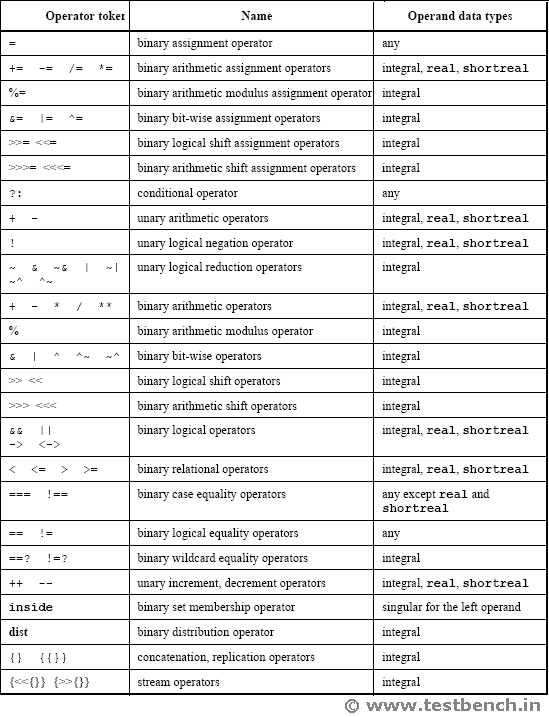
Assignment Operators
In addition to the simple assignment operator, =, SystemVerilog includes the C assignment operators and special bitwise assignment operators:
+=, -=, *=, /=, %=, &=, |=, ^=, <<=, >>=, <<<=,>>>=.
An assignment operator is semantically equivalent to a blocking assignment, with the exception that any left-hand side index expression is only evaluated once.
For example:
a[i]+=2; // same as a[i] = a[i] +2;
Following are the new SystemVerilog assignment operators and its equivalent in verilog
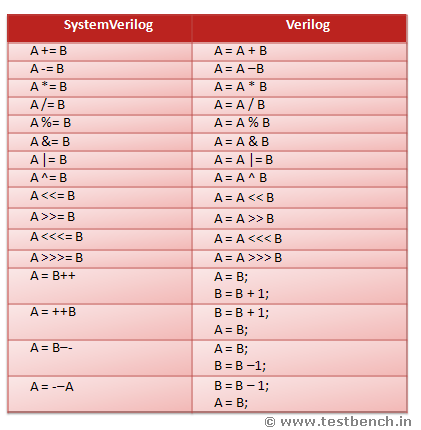
Assignments In Expression
In SystemVerilog, an expression can include a blocking assignment. such an assignment must be enclosed in parentheses to avoid common mistakes such as using a=b for a==b, or a|=b for a!=b.
if ((a=b)) b = (a+=1); // assign b to a
a = (b = (c = 5));// assign 5 to c
if(a=b) // error in systemverilog
(a=b) statement assigns b value to a and then returns a value.
if((a=b)) is equivalent to
a=b;
if(a)
EXAMPLE
module assignment();
int a,b,c;
initial begin
a = 1; b =2;c =3;
if((a=b))
$display(" a value is %d ",a);
a = (b = (c = 5));
$display(" a is %d b is %d c is %d ",a,b,c);
end
endmodule
RESULT
a value is 2
a is 5 b is 5 c is 5
Concatenation :
{} concatenation right of assignment.
´{} concatenation left of assignment.
EXAMPLE :Concatenation
program main ;
bit [4:0] a;
reg b,c,d;
initial begin
b = 0;
c = 1;
d = 1;
a = {b,c,0,0,d};
{b,c,d} = 3'b111;
$display(" a %b b %b c %b d %b ",a,b,c,d);
end
endprogram
RESULTS
a 00001 b 1 c 1 d 1
Arithmetic :
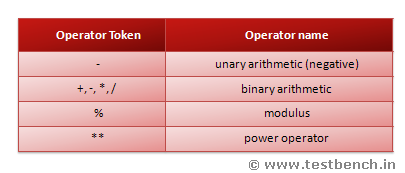
EXAMPLE :Arithmetic
program main;
integer a,b;
initial
begin
b = 10;
a = 22;
$display(" -(nagetion) is %0d ",-(a) );
$display(" a + b is %0d ",a+b);
$display(" a - b is %0d ",a-b);
$display(" a * b is %0d ",a*b);
$display(" a / b is %0d ",a/b);
$display(" a modulus b is %0d ",a%b);
end
endprogram
RESULTS
-(nagetion) is -22
a + b is 32
a - b is 12
a * b is 220
a / b is 2
a modules b is 2
Following tabel shows the opwer operator rules for calculating the result.
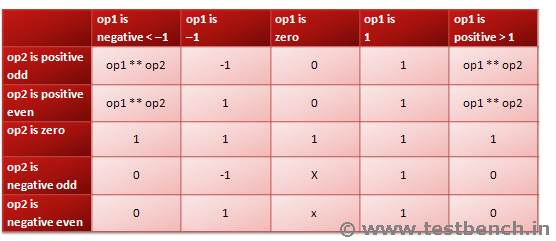
program main;
integer op1_neg,op1_n1,op1_0,op1_p1,op1_pos;
integer op2_pos_odd,op2_pos_even,op2_zero,op2_neg_odd,op2_neg_even;
initial
begin
op1_neg = -10;op1_n1 = -1;op1_0 = 0;op1_p1 = 1;op1_pos = 10;
op2_pos_odd = 9;op2_pos_even =10;op2_zero=0;op2_neg_odd =-9;op2_neg_even=-10;
$display(" | -10 -1 0 1 10");
$display("---|--------------------------------------------------------");
$display(" 9| %d %d %d %d %d",op1_neg**op2_pos_odd,op1_n1**op2_pos_odd,op1_0**op2_pos_odd,op1_p1**op2_pos_odd,op1_pos**op2_pos_odd);
$display(" 10| %d %d %d %d %d",op1_neg**op2_pos_even,op1_n1**op2_pos_even,op1_0**op2_pos_even,op1_p1**op2_pos_even,op1_pos**op2_pos_even);
$display(" 0| %d %d %d %d %d",op1_neg**op2_zero,op1_n1**op2_zero,op1_0**op2_zero,op1_p1**op2_zero,op1_pos**op2_zero);
$display(" -9| %d %d %d %d %d",op1_neg**op2_neg_odd,op1_n1**op2_neg_odd,op1_0**op2_neg_odd,op1_p1**op2_neg_odd,op1_pos**op2_neg_odd);
$display("-10| %d %d %d %d %d",op1_neg**op2_neg_even,op1_n1**op2_neg_even,op1_0**op2_neg_even,op1_p1**op2_neg_even,op1_pos**op2_neg_even);
end
endprogram
RESULT
| -10 -1 0 1 10
---|--------------------------------------------------------
9| 3294967296 4294967295 0 1 1000000000
10| 1410065408 1 0 1 1410065408
0| 1 1 1 1 1
-9| 0 4294967295 x 1 0
-10| 0 1 x 1 0
Relational :
# > >= < <= relational
EXAMPLE :Relational
program main ;
integer a,b;
initial
begin
b = 10;
a = 22;
$display(" a < b is %0d \n",a < b);
$display(" a > b is %0d \n",a >b);
$display(" a <= b is %0d \n",a <= b);
$display(" a >= b is %0d \n",a >= b);
end
endprogram
RESULTS
a < b is 0
a > b is 1
a <= b is 0
a >= b is 1
Equality :
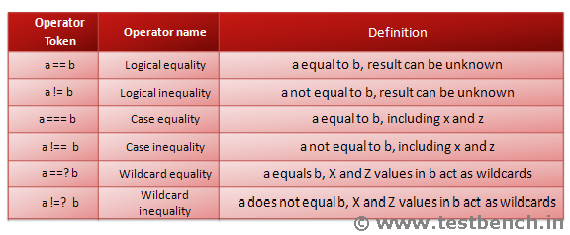
The different types of equality (and inequality) operators in SystemVerilog behave differently when their operands contain unknown values (X or Z). The == and != operators may result in X if any of their operands contains an X or Z. The === and !== check the 4-state explicitly, therefore, X and Z values shall either match or mismatch, never resulting in X. The ==? and !=? operators may result in X if the left operand contains an X or Z that is not being compared with a wildcard in the right operand.
EXAMPLE : logical Equality
program main;
reg[3:0] a;
reg[7:0] x, y, z;
initial begin
a = 4'b0101;
x = 8'b1000_0101;
y = 8'b0000_0101;
z = 8'b0xx0_0101;
if (x == a)
$display("x equals a is TRUE.\n");
if (y == a)
$display("y equals a is TRUE.\n");
if (z == a)
$display("z equals a is TRUE.\n");
end
endprogram
RESULTS:
y equals a is TRUE.
EXAMPLE:case equality:
program main ;
reg a_1,a_0,a_x,a_z;
reg b_1,b_0,b_x,b_z;
initial
begin
a_1 = 'b1;a_0 = 'b0;a_x = 'bx;a_z = 'bz;
b_1 = 'b1;b_0 = 'b0;b_x = 'bx;b_z = 'bz;
$display("--------------------------");
$display (" == 0 1 x z ");
$display("--------------------------");
$display (" 0 %b %b %b %b ",a_0 == b_0,a_0 == b_1,a_0 == b_x,a_0 == b_z);
$display (" 1 %b %b %b %b ",a_1 == b_0,a_1 == b_1,a_1 == b_x,a_1 == b_z);
$display (" x %b %b %b %b ",a_x == b_0,a_x == b_1,a_x == b_x,a_x == b_z);
$display (" z %b %b %b %b ",a_z == b_0,a_z == b_1,a_z == b_x,a_z == b_z);
$display("--------------------------");
$display("--------------------------");
$display (" === 0 1 x z ");
$display("--------------------------");
$display (" 0 %b %b %b %b ",a_0 === b_0,a_0 === b_1,a_0 === b_x,a_0 === b_z);
$display (" 1 %b %b %b %b ",a_1 === b_0,a_1 === b_1,a_1 === b_x,a_1 === b_z);
$display (" x %b %b %b %b ",a_x === b_0,a_x === b_1,a_x === b_x,a_x === b_z);
$display (" z %b %b %b %b ",a_z === b_0,a_z === b_1,a_z === b_x,a_z === b_z);
$display("--------------------------");
$display("--------------------------");
$display (" =?= 0 1 x z ");
$display("--------------------------");
$display (" 0 %b %b %b %b ",a_0 =?= b_0,a_0 =?= b_1,a_0 =?= b_x,a_0 =?= b_z);
$display (" 1 %b %b %b %b ",a_1 =?= b_0,a_1 =?= b_1,a_1 =?= b_x,a_1 =?= b_z);
$display (" x %b %b %b %b ",a_x =?= b_0,a_x =?= b_1,a_x =?= b_x,a_x =?= b_z);
$display (" z %b %b %b %b ",a_z =?= b_0,a_z =?= b_1,a_z =?= b_x,a_z =?= b_z);
$display("--------------------------");
$display("--------------------------");
$display (" != 0 1 x z ");
$display("--------------------------");
$display (" 0 %b %b %b %b ",a_0 != b_0,a_0 != b_1,a_0 != b_x,a_0 != b_z);
$display (" 1 %b %b %b %b ",a_1 != b_0,a_1 != b_1,a_1 != b_x,a_1 != b_z);
$display (" x %b %b %b %b ",a_x != b_0,a_x != b_1,a_x != b_x,a_x != b_z);
$display (" z %b %b %b %b ",a_z != b_0,a_z != b_1,a_z != b_x,a_z != b_z);
$display("--------------------------");
$display("--------------------------");
$display (" !== 0 1 x z ");
$display("--------------------------");
$display (" 0 %b %b %b %b ",a_0 !== b_0,a_0 !== b_1,a_0 !== b_x,a_0 !== b_z);
$display (" 1 %b %b %b %b ",a_1 !== b_0,a_1 !== b_1,a_1 !== b_x,a_1 !== b_z);
$display (" x %b %b %b %b ",a_x !== b_0,a_x !== b_1,a_x !== b_x,a_x !== b_z);
$display (" z %b %b %b %b ",a_z !== b_0,a_z !== b_1,a_z !== b_x,a_z !== b_z);
$display("--------------------------");
$display("--------------------------");
$display (" !?= 0 1 x z ");
$display("--------------------------");
$display (" 0 %b %b %b %b ",a_0 !?= b_0,a_0 !?= b_1,a_0 !?= b_x,a_0 !?= b_z);
$display (" 1 %b %b %b %b ",a_1 !?= b_0,a_1 !?= b_1,a_1 !?= b_x,a_1 !?= b_z);
$display (" x %b %b %b %b ",a_x !?= b_0,a_x !?= b_1,a_x !?= b_x,a_x !?= b_z);
$display (" z %b %b %b %b ",a_z !?= b_0,a_z !?= b_1,a_z !?= b_x,a_z !?= b_z);
$display("--------------------------");
end
endprogram
RESULTS
--------------------------
== 0 1 x z
--------------------------
0 1 0 x x
1 0 1 x x
x x x x x
z x x x x
--------------------------
--------------------------
=== 0 1 x z
--------------------------
0 1 0 0 0
1 0 1 0 0
x 0 0 1 0
z 0 0 0 1
--------------------------
--------------------------
=?= 0 1 x z
--------------------------
0 1 0 1 1
1 0 1 1 1
x 1 1 1 1
z 1 1 1 1
--------------------------
--------------------------
!= 0 1 x z
--------------------------
0 0 1 x x
1 1 0 x x
x x x x x
z x x x x
--------------------------
--------------------------
!== 0 1 x z
--------------------------
0 0 1 1 1
1 1 0 1 1
x 1 1 0 1
z 1 1 1 0
--------------------------
--------------------------
!?= 0 1 x z
--------------------------
0 0 1 0 0
1 1 0 0 0
x 0 0 0 0
z 0 0 0 0
--------------------------
The SystemVerilog operators are a combination of Verilog and C operators. In both languages, the type and size of the operands is fixed, and hence the operator is of a fixed type and size. The fixed type and size of operators is preserved in SystemVerilog. This allows efficient code generation.
Verilog does not have assignment operators or increment and decrement operators. SystemVerilog includes the C assignment operators, such as +=, and the C increment and decrement operators, ++ and --.
Verilog-2001 added signed nets and reg variables, and signed based literals. There is a difference in the rules for combining signed and unsigned integers between Verilog and C. SystemVerilog uses the Verilog rules.
Operators In Systemverilog
Following are the operators in systemverilog
Assignment Operators
In addition to the simple assignment operator, =, SystemVerilog includes the C assignment operators and special bitwise assignment operators:
+=, -=, *=, /=, %=, &=, |=, ^=, <<=, >>=, <<<=,>>>=.
An assignment operator is semantically equivalent to a blocking assignment, with the exception that any left-hand side index expression is only evaluated once.
For example:
a[i]+=2; // same as a[i] = a[i] +2;
Following are the new SystemVerilog assignment operators and its equivalent in verilog
Assignments In Expression
In SystemVerilog, an expression can include a blocking assignment. such an assignment must be enclosed in parentheses to avoid common mistakes such as using a=b for a==b, or a|=b for a!=b.
if ((a=b)) b = (a+=1); // assign b to a
a = (b = (c = 5));// assign 5 to c
if(a=b) // error in systemverilog
(a=b) statement assigns b value to a and then returns a value.
if((a=b)) is equivalent to
a=b;
if(a)
EXAMPLE
module assignment();
int a,b,c;
initial begin
a = 1; b =2;c =3;
if((a=b))
$display(" a value is %d ",a);
a = (b = (c = 5));
$display(" a is %d b is %d c is %d ",a,b,c);
end
endmodule
RESULT
a value is 2
a is 5 b is 5 c is 5
Concatenation :
{} concatenation right of assignment.
´{} concatenation left of assignment.
EXAMPLE :Concatenation
program main ;
bit [4:0] a;
reg b,c,d;
initial begin
b = 0;
c = 1;
d = 1;
a = {b,c,0,0,d};
{b,c,d} = 3'b111;
$display(" a %b b %b c %b d %b ",a,b,c,d);
end
endprogram
RESULTS
a 00001 b 1 c 1 d 1
Arithmetic :
EXAMPLE :Arithmetic
program main;
integer a,b;
initial
begin
b = 10;
a = 22;
$display(" -(nagetion) is %0d ",-(a) );
$display(" a + b is %0d ",a+b);
$display(" a - b is %0d ",a-b);
$display(" a * b is %0d ",a*b);
$display(" a / b is %0d ",a/b);
$display(" a modulus b is %0d ",a%b);
end
endprogram
RESULTS
-(nagetion) is -22
a + b is 32
a - b is 12
a * b is 220
a / b is 2
a modules b is 2
Following tabel shows the opwer operator rules for calculating the result.
program main;
integer op1_neg,op1_n1,op1_0,op1_p1,op1_pos;
integer op2_pos_odd,op2_pos_even,op2_zero,op2_neg_odd,op2_neg_even;
initial
begin
op1_neg = -10;op1_n1 = -1;op1_0 = 0;op1_p1 = 1;op1_pos = 10;
op2_pos_odd = 9;op2_pos_even =10;op2_zero=0;op2_neg_odd =-9;op2_neg_even=-10;
$display(" | -10 -1 0 1 10");
$display("---|--------------------------------------------------------");
$display(" 9| %d %d %d %d %d",op1_neg**op2_pos_odd,op1_n1**op2_pos_odd,op1_0**op2_pos_odd,op1_p1**op2_pos_odd,op1_pos**op2_pos_odd);
$display(" 10| %d %d %d %d %d",op1_neg**op2_pos_even,op1_n1**op2_pos_even,op1_0**op2_pos_even,op1_p1**op2_pos_even,op1_pos**op2_pos_even);
$display(" 0| %d %d %d %d %d",op1_neg**op2_zero,op1_n1**op2_zero,op1_0**op2_zero,op1_p1**op2_zero,op1_pos**op2_zero);
$display(" -9| %d %d %d %d %d",op1_neg**op2_neg_odd,op1_n1**op2_neg_odd,op1_0**op2_neg_odd,op1_p1**op2_neg_odd,op1_pos**op2_neg_odd);
$display("-10| %d %d %d %d %d",op1_neg**op2_neg_even,op1_n1**op2_neg_even,op1_0**op2_neg_even,op1_p1**op2_neg_even,op1_pos**op2_neg_even);
end
endprogram
RESULT
| -10 -1 0 1 10
---|--------------------------------------------------------
9| 3294967296 4294967295 0 1 1000000000
10| 1410065408 1 0 1 1410065408
0| 1 1 1 1 1
-9| 0 4294967295 x 1 0
-10| 0 1 x 1 0
Relational :
# > >= < <= relational
EXAMPLE :Relational
program main ;
integer a,b;
initial
begin
b = 10;
a = 22;
$display(" a < b is %0d \n",a < b);
$display(" a > b is %0d \n",a >b);
$display(" a <= b is %0d \n",a <= b);
$display(" a >= b is %0d \n",a >= b);
end
endprogram
RESULTS
a < b is 0
a > b is 1
a <= b is 0
a >= b is 1
Equality :
The different types of equality (and inequality) operators in SystemVerilog behave differently when their operands contain unknown values (X or Z). The == and != operators may result in X if any of their operands contains an X or Z. The === and !== check the 4-state explicitly, therefore, X and Z values shall either match or mismatch, never resulting in X. The ==? and !=? operators may result in X if the left operand contains an X or Z that is not being compared with a wildcard in the right operand.
EXAMPLE : logical Equality
program main;
reg[3:0] a;
reg[7:0] x, y, z;
initial begin
a = 4'b0101;
x = 8'b1000_0101;
y = 8'b0000_0101;
z = 8'b0xx0_0101;
if (x == a)
$display("x equals a is TRUE.\n");
if (y == a)
$display("y equals a is TRUE.\n");
if (z == a)
$display("z equals a is TRUE.\n");
end
endprogram
RESULTS:
y equals a is TRUE.
EXAMPLE:case equality:
program main ;
reg a_1,a_0,a_x,a_z;
reg b_1,b_0,b_x,b_z;
initial
begin
a_1 = 'b1;a_0 = 'b0;a_x = 'bx;a_z = 'bz;
b_1 = 'b1;b_0 = 'b0;b_x = 'bx;b_z = 'bz;
$display("--------------------------");
$display (" == 0 1 x z ");
$display("--------------------------");
$display (" 0 %b %b %b %b ",a_0 == b_0,a_0 == b_1,a_0 == b_x,a_0 == b_z);
$display (" 1 %b %b %b %b ",a_1 == b_0,a_1 == b_1,a_1 == b_x,a_1 == b_z);
$display (" x %b %b %b %b ",a_x == b_0,a_x == b_1,a_x == b_x,a_x == b_z);
$display (" z %b %b %b %b ",a_z == b_0,a_z == b_1,a_z == b_x,a_z == b_z);
$display("--------------------------");
$display("--------------------------");
$display (" === 0 1 x z ");
$display("--------------------------");
$display (" 0 %b %b %b %b ",a_0 === b_0,a_0 === b_1,a_0 === b_x,a_0 === b_z);
$display (" 1 %b %b %b %b ",a_1 === b_0,a_1 === b_1,a_1 === b_x,a_1 === b_z);
$display (" x %b %b %b %b ",a_x === b_0,a_x === b_1,a_x === b_x,a_x === b_z);
$display (" z %b %b %b %b ",a_z === b_0,a_z === b_1,a_z === b_x,a_z === b_z);
$display("--------------------------");
$display("--------------------------");
$display (" =?= 0 1 x z ");
$display("--------------------------");
$display (" 0 %b %b %b %b ",a_0 =?= b_0,a_0 =?= b_1,a_0 =?= b_x,a_0 =?= b_z);
$display (" 1 %b %b %b %b ",a_1 =?= b_0,a_1 =?= b_1,a_1 =?= b_x,a_1 =?= b_z);
$display (" x %b %b %b %b ",a_x =?= b_0,a_x =?= b_1,a_x =?= b_x,a_x =?= b_z);
$display (" z %b %b %b %b ",a_z =?= b_0,a_z =?= b_1,a_z =?= b_x,a_z =?= b_z);
$display("--------------------------");
$display("--------------------------");
$display (" != 0 1 x z ");
$display("--------------------------");
$display (" 0 %b %b %b %b ",a_0 != b_0,a_0 != b_1,a_0 != b_x,a_0 != b_z);
$display (" 1 %b %b %b %b ",a_1 != b_0,a_1 != b_1,a_1 != b_x,a_1 != b_z);
$display (" x %b %b %b %b ",a_x != b_0,a_x != b_1,a_x != b_x,a_x != b_z);
$display (" z %b %b %b %b ",a_z != b_0,a_z != b_1,a_z != b_x,a_z != b_z);
$display("--------------------------");
$display("--------------------------");
$display (" !== 0 1 x z ");
$display("--------------------------");
$display (" 0 %b %b %b %b ",a_0 !== b_0,a_0 !== b_1,a_0 !== b_x,a_0 !== b_z);
$display (" 1 %b %b %b %b ",a_1 !== b_0,a_1 !== b_1,a_1 !== b_x,a_1 !== b_z);
$display (" x %b %b %b %b ",a_x !== b_0,a_x !== b_1,a_x !== b_x,a_x !== b_z);
$display (" z %b %b %b %b ",a_z !== b_0,a_z !== b_1,a_z !== b_x,a_z !== b_z);
$display("--------------------------");
$display("--------------------------");
$display (" !?= 0 1 x z ");
$display("--------------------------");
$display (" 0 %b %b %b %b ",a_0 !?= b_0,a_0 !?= b_1,a_0 !?= b_x,a_0 !?= b_z);
$display (" 1 %b %b %b %b ",a_1 !?= b_0,a_1 !?= b_1,a_1 !?= b_x,a_1 !?= b_z);
$display (" x %b %b %b %b ",a_x !?= b_0,a_x !?= b_1,a_x !?= b_x,a_x !?= b_z);
$display (" z %b %b %b %b ",a_z !?= b_0,a_z !?= b_1,a_z !?= b_x,a_z !?= b_z);
$display("--------------------------");
end
endprogram
RESULTS
--------------------------
== 0 1 x z
--------------------------
0 1 0 x x
1 0 1 x x
x x x x x
z x x x x
--------------------------
--------------------------
=== 0 1 x z
--------------------------
0 1 0 0 0
1 0 1 0 0
x 0 0 1 0
z 0 0 0 1
--------------------------
--------------------------
=?= 0 1 x z
--------------------------
0 1 0 1 1
1 0 1 1 1
x 1 1 1 1
z 1 1 1 1
--------------------------
--------------------------
!= 0 1 x z
--------------------------
0 0 1 x x
1 1 0 x x
x x x x x
z x x x x
--------------------------
--------------------------
!== 0 1 x z
--------------------------
0 0 1 1 1
1 1 0 1 1
x 1 1 0 1
z 1 1 1 0
--------------------------
--------------------------
!?= 0 1 x z
--------------------------
0 0 1 0 0
1 1 0 0 0
x 0 0 0 0
z 0 0 0 0
--------------------------
Index
Introduction
Data Types
Literals
Strings
Userdefined Datatypes
Enumarations
Structures And Uniouns
Typedef
Arrays
Array Methods
Dynamic Arrays
Associative Arrays
Queues
Comparison Of Arrays
Linked List
Casting
Data Declaration
Reg And Logic
Operators 1
Operators 2
Operator Precedency
Events
Control Statements
Program Block
Procedural Blocks
Fork Join
Fork Control
Subroutines
Semaphore
Mailbox
Fine Grain Process Control
Report a Bug or Comment on This section - Your input is what keeps Testbench.in improving with time!

Introduction
Data Types
Literals
Strings
Userdefined Datatypes
Enumarations
Structures And Uniouns
Typedef
Arrays
Array Methods
Dynamic Arrays
Associative Arrays
Queues
Comparison Of Arrays
Linked List
Casting
Data Declaration
Reg And Logic
Operators 1
Operators 2
Operator Precedency
Events
Control Statements
Program Block
Procedural Blocks
Fork Join
Fork Control
Subroutines
Semaphore
Mailbox
Fine Grain Process Control
Report a Bug or Comment on This section - Your input is what keeps Testbench.in improving with time!

